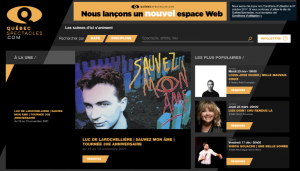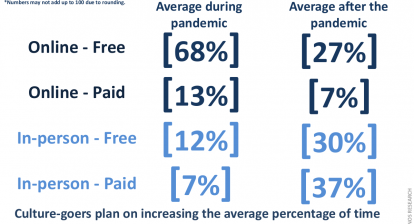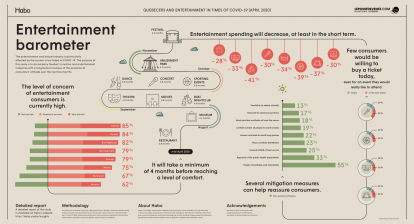Guest blog post by Clare Daitch
On November 18th, I had the opportunity to facilitate a fascinating conversation with colleagues from the tourism sector at the CAPACOA Conference. We discussed trends within the experience economy and how to foster collaborations between tourism and the performing arts.
Research shows that amongst travellers, there is a growing desire for authentic experiences that enliven and deepen connections to place. Live events and festivals provide these types of experiences year round. Both performing arts and tourism have been heavily impacted by the COVID-19 pandemic. While both sectors have struggled, the pandemic has provided an opportunity to reflect and provide greater alignment.
What are the Canadian tourism trends currently impacting travellers?
David Robinson, Vice-President of Strategy and Stakeholder Relations with Destination Canada shared insights and analytics gathered through the past 18 months, as tourism was severely disrupted by the COVID-19 pandemic. Tourism in Canada has never been in such a state of crisis. In the initial wave, the industry lost 500,000 jobs. Based on current trends, tourism in Canada is not expected to recover to 2019 levels until 2025 or 2026. Tourism businesses contribute to the quality of life and fabric of the places we live, including festivals and events, recreation venues, art services and amenities. Consequently, the impacts of the downturn affects communities across the country.
How will the tourism sector emerge from the pandemic?
Based on industry scans, Destination Canada predicts key market trends as the sector emerges from the pandemic. Of particular importance to the performing arts, travellers are increasingly forming an aspirational view of travel, pursuing personal growth and enrichment. Destination Canada defines these as “high value travellers,” who seek cultural experiences, Indigenous tourism experiences, and ways to engage more deeply with the places they visit. These types of travellers represent a key opportunity for festivals, live performances and events organizers. Research shows that tourism will restart at the hyperlocal level, and many organizations have been highly innovative to focus opportunities on local markets.
Overall, Canada lags behind other OECD countries when it comes to digital maturity. There are opportunities to work on data strategies to connect visitors to the experiences they seek. There is also a pent up demand for travel internationally. Destination Canada works from the premise that tourism should enhance the economic, socio-cultural and environmental quality of life for Canadians, and there are opportunities to collaborate with the performing arts sector as the sector recovers.
Presentation by Destination Canada
Inspiring Stories
Three tourism initiatives from QuébecSpectacles

Christian Roy presented a case study of three regional initiatives designed to reach tourists. QuébecSpectacles is a website portal that presents arts offerings from two regions – Quebec City and neighbouring Chaudière-Appalache. QuébecSpectacles amalgamates events from 40 different producers and has engaged in three innovative digital initiatives to help people discover live performances. These initiatives focus on disseminating event information where people are most likely to find them, rather than focusing on drawing them to the website.
Google search optimization – QuébecSpectacles integrated detailed structured data to its events listings site so that popular search engines such as Google would automatically present event results in an enriched format, with dates and times. This allows both locals and visitors to easily find event information.
Media ecosystem collaboration – QuébecSpectacles collaborated with the regional Le Soleil newspaper (part of a consortium of six regional newspapers). This partnership ensures that when visitors scroll the arts section, they will see a calendar of shows and events, populated automatically from QuébecSpectacles listings.
Hotel collaboration – QuébecSpectacles created a customized newsletter and signed up hotel concierges across the region. This targeted newsletter is sent out daily, outlining arts events happening so that concierges can provide timely information to visitors.
Presentation by QuébecSpectacles
Destination Toronto and arts audience development
Like all regions in Canada, tourism in Toronto was heavily impacted by the COVID-19 pandemic. While the pace of recovery is hard to predict, the desire to travel remains strong, explained presenter Sarah Jarvis. Emerging trends show that travel has become more thoughtful. Travelers are increasingly seeking underrepresented and authentic stories and expressing desire to connect with a sense of place.
It is more effective for cultural events to try and reach travellers who are in a destination. The DestinationNEXT Futures Study identified important trends on how visitors access and use event information. Digital hubs, such as directories and event listings, are effective in reaching local and travelling audiences. These types of hubs can be leveraged by small organizations to access big audiences at little or no cost.
Toronto Event Database
To take advantage of emerging opportunities, Destination Toronto created the Toronto Event Database, with the goal of increasing the impact of the city’s arts and cultural organizations, events and venues and to develop new audiences. The Toronto Event Database does this by acting as an aggregator and disseminator of event information. Contributors can enter event information into a centralized portal that pushes data feeds to several listings, including Now Playing Toronto.
Now Playing Toronto
Destination Toronto also created the Now Playing Toronto website. This event calendar is primarily targeted to locals, but also aims to reach cultural enthusiast travellers. Users can search and discover events in Toronto, find the dates and times of show, and customize the information that they are receiving based on interests.
Presentation by Destination Toronto
Fostering partnerships
All of the participants in this discussion highlighted the importance of fostering partnerships between the arts and tourism to reach travelling audiences and benefit both sectors. A good starting point is to engage with local Destination Marketing Organizations. Digital strategies allowing for the aggregation and customization of event information are also key to reaching new audiences seeking cultural experiences and performing art events and shows.
The webinar was co-presented by CAPACOA, the Toronto Alliance for the Performing Arts and Mass Culture.






